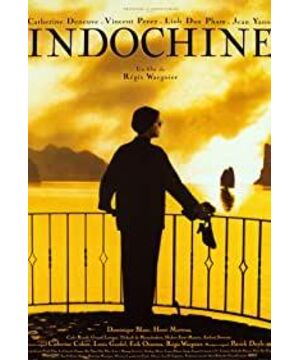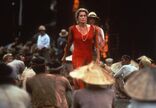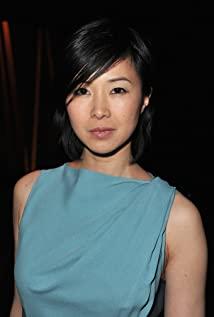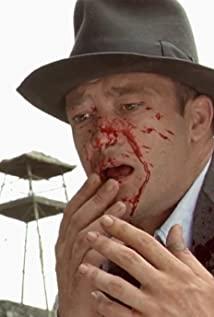Some people say that Vietnam is an eternal shadow in the hearts of Americans, while the French have a complex feeling of love and hatred for this land in the Far East, just as the British do to India and Hong Kong, after all, some history is unforgettable. I still remember the quietly flowing Mekong River in "Lover", the magnificent lights of Saigon, and the oil tankers slowly sailing out of the harbor... Aesthetic and sentimental, this is Indochina, before independence, Vietnam was once a colony that the French thought forever.
"When I was young, I thought that some things in the world are closely related, men and women, mountains and peace, mortals and gods, Indochina and France..." The calm after the vicissitudes of life, the melancholy that can hardly be felt, the low female voice In 1954, the day before the "Geneva Conference", on a cruise ship on Lake Geneva, Ariane told a young child this story. The story about her life was a breeze. dream.
In my impression, the films about Vietnam are always beautiful and exquisite, like a song of bamboo and bamboo, quiet and distant, just like the green and tranquil in "The Taste of Green Papaya", which is nostalgic with the mentality of a Vietnamese Frenchman. The homeland is the beautiful countryside in Chen Yingxiong’s impression, and memories are often sublimated unconsciously, just like Shen Congwen’s Phoenix Town and Lu Xun’s childhood Baicao Garden. The more alienated and distant, the more beautiful. , The more charming.
For Indochina, the French will always have romantic illusions, and they will always cherish the memory of the once "golden" glorious years spent in this country. But in fact, Indochina in the 1930s was turbulent, endless revolutions, frequent replacements of old and new forces... But the film was still beautifully shot, with the plantations filled with morning mist and tall rubber trees slowly Flowing milky white gum...the smoke-like past, all the images are filled with the fascinating grace of the east, permeated with the fresh pastoral wind, and even with the legendary romantic color, just like the French nation Unique personality is average.
Ariane played by Catherine Deneuve often reminds me of the heroine who walked into Kenya in East Africa alone in "Out of Africa", and even their experiences are very similar, but Kenya is more isolated from the world without Saigon. The stray bullets fly across the street, and the yin and yang barrier between Karen and her lover is not worth the relative speechless but indefinite melancholy. Although Deneuve lacks the kindness of Meryl Streep, he has the noble temperament that Americans lack. It can indeed best reflect the romance and elegance in the bones of French women. Ariane is from France and grew up in Indochina. She is beautiful, wealthy, strong and capable. She owns 6,000 hectares of oak orchard industry and is favored by the colonial security minister who loves her. She adopted Annan's little princess Kamei, whose parents both died, as her daughter.
A peaceful life is always broken by an accident. Isn't it because of a chance encounter and a look in the eyes? The handsome naval officer makes appearance in Ariane's life through twists and turns. The French actor Vanchant Perret, who played Jean, was still very young at the time, with a classical and melancholic face. He was the romantic lover whom the beautiful and pure Fangfang in "Fangfang" was also fascinated by, especially his eyes were bewitching. A sense of confusion that makes people try to break free from moral shackles. Perhaps it was the vigorous lust created by the hot climate of the tropical rainforest. Faced with the fiery eyes that made him stare at her, Ariane couldn't help being confused. This sudden suddenness finally made her stop being as indifferent as before. The date in the old house in Saigon and the passionate lingering in the car can no longer leave traces, "I love him, and I know he loves me too", even if Under the good calm that Ariane concealed, the tenderness of the heart could still be found between the eyes.
But this time lust has not become a weapon to dominate everything, this relationship hastily started and ended, let the choice to leave. Just as I don’t know why he fell in love with Ariane in the first place, because of her maternal brilliance, her strength and peace, or what? I also don’t know why he left. Was it because of her stunning capital and background, or because of her disparity in status, or because of her ideals? Maybe my understanding of freedom is always lacking. I don't really understand that life without freedom is as suffocating as Saigon without coastline. He didn’t want to be her docile lover and didn’t want everything she gave, "I want the whole world, not a corner of the grave." In his ideals, this relationship might become an obstacle to his pursuit of freedom, so he chose give up.
Just as the ripples of the birds flying over the water quickly returned to calm, not to mention that no one knew about Ariane's pain. She chose to remember her silently alone. Under her calmness concealed her helplessness and great sorrow for fate. Until one day Camay solemnly told her that mother I cannot marry a man I don't love, I fell in love with a man, his name is Jean Battis. At that moment, if you can see through your heart, you can definitely see that Ariane's heart is shattering one by one. Her love and her memories become pains that can't be touched in an instant.
Because of offending her, she was exiled by the navy to the most remote and desolate Longwan. Kamy was soon accused by the court of marrying a man she didn't love. He spent day after day in boredom and loneliness, while she was newly married. Night escapes and embarks on the road of finding love. Fate once again pushed Ariane into the most paradoxical and helpless situation, and she could not even decide what attitude she should adopt to deal with this sudden incident. Jean and Camey are finally together. They betrayed the colony and started a life of escape. They fell in love with each other in the drift and gave birth to their children. Camey’s love for Jean was love at first sight and unreserved. Even after understanding the story between Ariane and Jean, he still pursued desperately. However, Jean experienced a hard escape and was caught by Camey’s courage and courage. Being strong was deeply moved, just like being attracted by Ariane, the choice he made in the end has completely surpassed the initial gratitude and touch.
The film accurately captures the political atmosphere of that era, placing the small individual under the grand historical background. The small is smaller and the grand is more grand. It is helpless to fight against the historical individual. Because of its helplessness, it highlights the tragedy. Atmosphere, the essence of life is nothing better than it is. The ups and downs of the characters' destiny, the opening and closing of the story, the legend of the turbulent times, hides an unforgettable love, but makes a relationship that might have been dull become resonant. From the Chinese border to Saigon, it is repeated on hundreds of stages. As the love between Rang and Came spreads all over, it is touching, and it makes people even more embarrassed by the feelings in Ariane's heart that were suppressed at the beginning but still can't let go.
Let it die. At first, he betrayed Ariane’s love for freedom, and finally, for freedom, he betrayed the revolution in Indochina. The ambiguity in political stance and the attitude of both ends of the mouse are indeed very unappreciable, so his death It is also expected. It’s just that I think this character was originally isolated from politics. In his body, he is more of a dedication to idealism, and nothing else. Let life pursue freedom, but like the goshawk hovering in the labyrinthine waters of Harang Bay, it can never break through the heavy haze. The relationship between him and Ariane seems to be a metaphor for the relationship between Indochina and France. This kind of metaphor is more clearly reflected in Kamey and Ariane. The default relationship between the mother and daughter of the sovereign state and the colony, the conflict within the family is actually the epitome of the colony’s struggle against the sovereign state.
The position of French director Reggie Wagoner is not entirely on the side of the colonists. In Indochina, there is no intention to promote French colonial culture, and some treatments are quite radical. The scene of selecting labor in Longwan is exactly the same as the barbaric act of selling slaves in the United States described in "The Roots". The contrast between the rigorous waiting of the French soldiers with guns and the tired faces of the ragged laborers is self-evident.
However, the director more often expresses a kind of nameless loss through homesickness, thereby naturally forming a silent questioning and criticism of colonial culture. The peaceful villages like a paradise, the blue sky, and the clear water, these deliberately captured beautiful scenery contrasted sharply with the displaced refugees and fugitive revolutionaries. Kamey was not so radical. The initial choice was somewhat driven by fate, but on the way to Longwan, the "scenery flowed into her heart like blood through her eyes" on the way to Longwan. In the end, "she pretended to be It’s the whole of Indochina.” Such a transformation is abstract and symbolic. From the comfortable and honorable Princess Annan to later members of the Viet Communist Party, her real life has allowed her to experience the suffering and misfortune that this country is suffering. The French taught her the concept of freedom and equality to give birth to her growth, and she will never look back. If the anti-marriage running away was only due to the girl’s pursuit of dreams of love, then her transformation has already had a solid foundation in reality. The personality of Ariane’s “never give up Asian” is expressed in Camey. It's so vivid and vivid.
After letting his death, Ariane finally saw Kamey after she was released from prison. The two hugged tightly again. Kamey asked about the child and cried, but still said to her mother, "Go to France, take it with you." He, your Indochina no longer exists, it is dead", yes, Indochina is gone, and Kamy is no longer the meek daughter of the past. Saying goodbye to the past, Camay chose a decisive gesture, forgetting the past, including all the graces, all the happiness and sorrow, and there is no need to look back in order to start again and be free. Kamy later participated in the revolution and fought for the freedom of more people, until many years later he also came to Geneva as a member of the Vietnamese negotiating delegation.
There is no imaginary exciting mother and son to recognize each other, the past is over, no matter the pain or joy, looking back is only a stunned, young Yiting chooses to be loyal to everything he has now, a comfortable culture, he treats Ellie Ann said, "You are my mother." On that cruise ship, Ariane sighed, "Tomorrow France will lose Indochina forever." In fact, her Indochina no longer exists. After Kamy left, after his death, the memory of Indochina followed. The pieces were shattered and scattered all over.
A life like a dream, she lost everything she once had, and the people she loved eventually left her. The once thought to be a permanent connection, men and women, Indochina and France, all collapsed in the vicissitudes of the world. I always feel that Ariane is the most tragic character. The years are passing away, the time is passing away, and the lines of pain in life extend endlessly between her calm eyes and expressions.
In the end she left us the staring back figure, what is she staring at, is it the endless past like flowing water, or the memory of Indochina, or Kamy, or Jean?
View more about Indochine reviews











